Click links for programme and registration form, spaces limited!
Programme for SIXTH Annual Wessex CRN and Regional BGS 18 Sept 2018 with sponsors v3
REGISTRATION FORM for 6th annual Wessex CRN Research BGS MEET
Latest research and knowledge exchange news at Bournemouth University
This part of the blog features news and information for postgraduate research students and supervisors
Click links for programme and registration form, spaces limited!
Programme for SIXTH Annual Wessex CRN and Regional BGS 18 Sept 2018 with sponsors v3
REGISTRATION FORM for 6th annual Wessex CRN Research BGS MEET
 Join Dr Patrick Brindle from INTO Content on the 3rd October 2018 9:30-16:30 for Writing about Methods course. To book click here Join Dr Patrick Brindle from INTO Content on the 3rd October 2018 9:30-16:30 for Writing about Methods course. To book click here
The session will talk about a range of practical approaches they can adopt when writing about methodology in the social sciences. The course focuses on 20 or so writing strategies and thought experiments designed to provide more clarity and power to the often-difficult challenge of writing about methods. The course also looks at common mistakes and how to avoid them when writing about methods. The focus throughout is on building confidence and increasing our repertoire of writing strategies and skills. The course covers:
By the end of the course participants will:
This course would be suitable for PhD students, post-docs and junior researchers in the social sciences. To book click here |

Dr Paul Whittington pictured front far left

Cumberland Lodge in Windsor Great Park
Cumberland Lodge – an educational charity which tackles social divisions by promoting creative thinking and inclusive dialogue – held its 11th annual ‘Life Beyond the PhD’ conference.
Held over 5 days, the conference brought together PhD students and early career researchers for thought-provoking workshops, presentations and activities which explored the value of doctoral research both inside and outside of academia. Underpinning each of the activities was the Cumberland Lodge’s ethos of inclusivity, and insightful, interdisciplinary discussion.
Dr Paul Whittington, who completed his PhD in 2017 in the Faculty of Science & Technology, attended and benefitted greatly from presentations which included a variety of topics: Research Culture in the UK, Self-Leadership for Researchers, Techniques for Impact through speaking and writing, Public Engagement and Writing Interdisciplinary Research Proposals. These were presented by a variety of academics from institutions, including The University of Cambridge, Guardian Higher Education Network, Government Equalities Office and the University of London.
Paul also had the opportunity to collaborate with PhD students from around the country and to discuss and present his research to other delegates. On one day, he participated in an interdisciplinary team project which involved producing and presenting a research proposal tackling some form of social exclusion to a panel followed by a Q&A session. Paul presented a slide and subsequently his team won the challenge and received the “funding” – a box of chocolates that was then shared amongst the other teams.
Paul said: “Thank you very much to the Doctoral College for providing me with the opportunity to attend the Life Beyond the PhD Conference at Cumberland Lodge. It was very valuable to me and greatly appreciated.”
Congratulations to PhD student Mrs Preeti Mahato who has a research methods paper published based on her PhD study in Nepal [1]. In the areas of health promotion and health education, mixed-methods research approach has become widely used. In mixed-methods research, also referred to as multi-methods research, researchers combine quantitative and qualitative research designs in a single study. This paper introduces the mixed-methods approach for use in research in health education. To illustrate this pragmatic research approach the paper includes Preeti’s thesis as an example of mixed-methods research as applied in Nepal.
The paper, in the Journal of Health Promotion, is co-authored by Preeti’s PhD supervisors Dr. Catherine Angell and Prof. Edwin van Teijlingen (both in the Centre for midwifery, Maternal &Perinatal Health) and BU Visiting Faculty Prof. Padam Simkhada.

Reference:
Design, Manufacture and Commissioning of a New Adapter Design for the Reciprocating Tribometer
A tribometer is used to measure the coefficient of friction between a pair of specimens in contact. Locally manufactured test specimens necessitated the exploration of carrying out modifications to the tribometer adapter. This poster, which was presented at the 10th Annual BU PGR Conference held in March 2018, addresses the importance, problem definition and novelty aspects of the modified adapter design for holding the fixed specimen in a reciprocating tribometer. Click the title to see the full poster.
The Doctoral C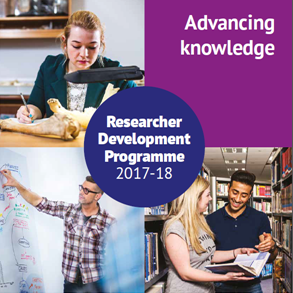 ollege would like to present the August monthly update.
ollege would like to present the August monthly update.
In this August update we would like you to be reminded that the Doctoral College is open all summer and we are still holding one-to-one support sessions, so if you are not sure where to begin with your researcher development or where to go, come along and speak to one of us. Also, remember that the August Summer School Masterclass is now bookable click here.
Be aware that the brand new Doctoral College: Researcher Development Programme on Brightspace is now live. Workshop bookings, online resources and modules, plus much more are now accessible on this new platform. If you cannot access the platform, please get in touch.
Don’t forget to check out the Doctoral College Facebook page.

Picture source: iodawards.com
BU PGR Aishah Selamat a third year PhD student from the Creative Technology Department has been shortlisted for the Institute of Directors (IoD) Student of the Year Award 2018. The award is aimed at recognizing students who have shown directors qualities in a project they have worked on in a business, employment or academic capacity. The IoD is the UK’s longest-running organization for professional and business leaders.
Aishah has recently pitched her project, alongside, her additional contributions to travelmanagement4u.com, UK Data Service, Global Blockchain Consortium and academic visiting lectureship to a group of judges at IoD’s main office in London. The winner of the Student of the Year Award 2018 will be announced at the prestigious Director of the Year Awards on the 18th October 2018 at the Royal Horticultural Halls.
On the 13th July 2018, the Ageing and Dementia Research Centre (ADRC) hosted a free half-day workshop for dementia practitioners and academics interested in understanding how digital gaming technology can be used to support the well-being of people with dementia and their care partners.
The event was attended by people from a range of professional backgrounds including care home staff, day centre Activity Coordinators, community volunteers, researchers and local Government. The morning session provided them with the opportunity to listen to presentations from:
During the afternoon session, the attendees were provided with a more ‘hands-on’ opportunity to use the applications and talk to the researchers in more detail about how the technology could be incorporated within their practice. These sessions were facilitated by Bournemouth University students Amy Dytham, Amy-Jane Pegler and Olivia Bryant who have been involved as Research Assistants in a number of the projects.
The event provoked some interesting questions and seemed to raise awareness of how technology can be used in the future care of people with dementia; both in providing those living with the condition with better opportunities for meaningful leisure activities and those supporting them with a more informed understanding of what it may be like to live with a dementia. The event also provided a great networking opportunity for the attendees, and discussions regarding future collaborations are already underway.
For more information on the event or for a copy of the presentations that were delivered on the day please contact Ben Hicks on bhicks@bournemouth.ac.uk.
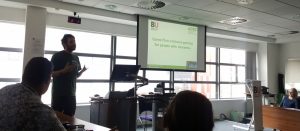
Ben Hicks discussing the HEIF funded Game Plan project
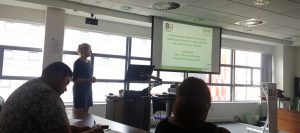
Laura Wade discussing A Walk Through Dementia

Phil Joddrell discussing the development of the AcTo Dementia website
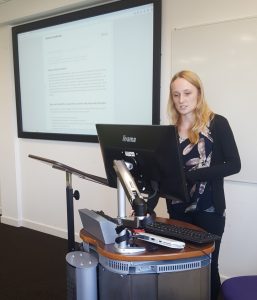
Amy Dytham leading a training session on the AD-Gaming platform

Some thought provoking discussions
Yolanda Barrado-Martín from the Psychology Department and Ageing and Dementia Research Centre (ADRC) attended the 47th edition of the British Society of Gerontology in Manchester (UK) from 3rd July to 6th July 2018.
International researchers from different disciplines gathered in Manchester to learn about projects under the theme “Ageing in an Unequal World: Shaping Environments fro the 21st Century”. This was a very well attended conference (with a waiting list), with up to 17 parallel sessions. Dementia had a relevant space in this conference with different sessions highlighting the use of diverse interventions to improve the quality of life of people living with dementia and those providing support such as facilitating decision making processes, exploring environmental adaptations and supporting home-care for those willing to stay at home.
Yolanda Barrado-Martín had an oral presentation entitled: “How is Tai Chi received by people living with dementia and their informal carers?” Those attending the session showed their interest in the topic and asked questions about people living with moderate dementia’s involvement in the classes and about the Ransomised Controlled Trial Phase of the study. This was a great experience for Yolanda who presented her PhD pilot results to a friendly international audience.
The ADRC’s work was also represented by Dr Michele Board who gave a presentation on “Evaluating the impact of the Virtual Reality app ‘A Walk Through Dementia’, and Mananya Podee who discussed leisure activity, arts and social inclusion for those with dementia.
Participation in the BSG conference was a valued addition in knowledge regarding psycho-social interventions for people living with dementia and a great opportunity to network with researchers from the gerontology background. Yolanda’s attendance to this conference was possible thanks to one of the Santander Mobility Awards.
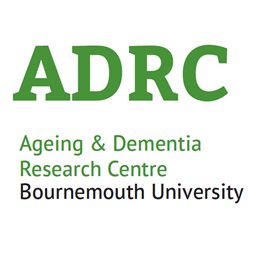
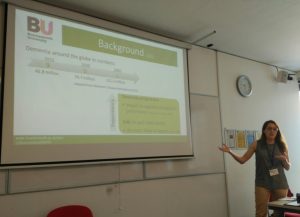
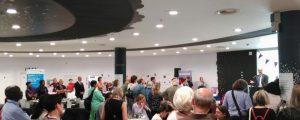
British Society of Gerontology 47th Annual Conference – Ageing in an Unequal World: Shaping Environments for the 21st Century.
 The Centre for Qualitative Research welcomes new members and invites them to contribute to our on-going and successful Seminar Series in the coming Academic Year.
The Centre for Qualitative Research welcomes new members and invites them to contribute to our on-going and successful Seminar Series in the coming Academic Year. Some possibilities:
Some possibilities:
Upon the invitation of Prof Hongnian Yu, the team from Chinese Academy of Sciences was visiting Bournemouth University to conducted a Newton funded project, Adaptive Learning Control of a Cardiovascular Robot using Expert Surgeon Techniques, from 26 June to 7 July 2018. Two teams have exchanged the ideas, the project progress and the future plan. They had several meetings and discussion sessions.

Prof Hongnian Yu and Dr Carol Clark visited Chinese Academy of Sciences in May 2017, and visited their labs and organized a project workshop. This Newton funded project is closely related to three of BU2025 strategic areas – medical sciences, assistive technology and animation, simulation & visualisation. The project has potential to generate some real impacts to our society and manufacturing industry which can be used for the future REF impact case.


Posted on behalf of Dr Carol Clark
The European Media Management Association Doctoral Summer School is a bi-annual event that has previously been run by institutions in Germany, Spain, Sweden, Portugal and Zurich. This year the Advances in Media Management (AiMM) research group hosted an international group of doctoral students at BU.
Dr John Oliver, Associate Professor of Media Management, said that “our aim was to create a community of learning where doctoral students, media industry professionals, BU faculty and professional services staff fused media management theory and practice to define the next generation of media management challenges”.
On the social side, delegates were given a Dorset cider tasting experience, an opportunity to see the grave site of Mary Shelley (author of Frankenstein) and a Gala Dinner in The Library of the Miramar Hotel in Bournemouth.
Dr Oliver would also like to thank the Doctoral College for their support and those members of the AiMM team that helped plan and deliver what can only be considered to be an “excellent event” that has contributed to BUs international profile and reputation. Many thanks to: Dr Joyce Costello, Dr Chris Chapleo, Melanie Gray, Graham Goode, Maria Musarskaya, Muridzo Searchmore and Conor O’Kane.
 Hai Luu (PhD student working with Prof Genoveva Esteban and Dr Iain Green in the Department of Life and Environmental Sciences, SciTech) travelled to her home country of Vietnam where she organised a seminar on microscopic life for 20 undergraduate students of the Aqua-Agriculture Faculty at Travinh University. Students collected samples from freshwater ponds, and observed the single-celled and other microscopic organisms that thrive in such habitats; they also studied their diversity in soil samples. Hai Luu gave a presentation about the diversity of organisms that constitute the unicellular protists, including micro-algae, protozoa, and slime molds. This event was a great opportunity for the students to recognise the biodiversity of micro-organisms in soils and fresh waters, and to understand the important role they play in food webs. The seminar was the first of its kind at Travinh University, and a unique opportunity to disseminate the research we do in this field at BU to a wider audience. Excellent feedback was received from the enthusiastic group of students.
Hai Luu (PhD student working with Prof Genoveva Esteban and Dr Iain Green in the Department of Life and Environmental Sciences, SciTech) travelled to her home country of Vietnam where she organised a seminar on microscopic life for 20 undergraduate students of the Aqua-Agriculture Faculty at Travinh University. Students collected samples from freshwater ponds, and observed the single-celled and other microscopic organisms that thrive in such habitats; they also studied their diversity in soil samples. Hai Luu gave a presentation about the diversity of organisms that constitute the unicellular protists, including micro-algae, protozoa, and slime molds. This event was a great opportunity for the students to recognise the biodiversity of micro-organisms in soils and fresh waters, and to understand the important role they play in food webs. The seminar was the first of its kind at Travinh University, and a unique opportunity to disseminate the research we do in this field at BU to a wider audience. Excellent feedback was received from the enthusiastic group of students.
Dr Samuel Nyman and Yolanda Barrado-Martín from the Psychology Department and Ageing and Dementia Research Centre (ADRC) attended the 4th EU Falls Festival in Manchester on 2nd and 3rd July 2018.
International researchers met in Manchester to learn about current projects under the theme, “New Solutions to Old Problems: Ensuring sustainability of falls prevention interventions”. Yolanda Barrado-Martín presented a poster entitled: “How is Tai Chi received by people living with dementia and their informal carers?” Attendants showed interest in the poster over the two day conference and voted Yolanda´s as the second best poster of the conference!
This year’s conference included sessions around Cochrane Updates on falls preventions, the use of new technologies to prevent falls, epidemiology and the implementation of research into practice. This year there was also a space for specific conditions such as dementia and the use of “qigong” to improve balance and prevent falls amongst older adults, which made this conference particularly relevant for the TACIT Team.
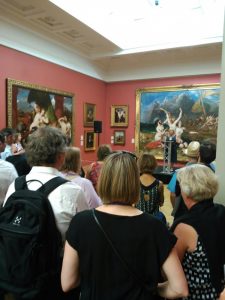
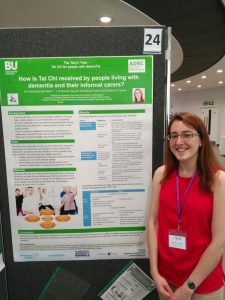
You can learn more and keep updated about the TACIT Trial via the following links:
The TACIT Trial Facebook page.
The TACIT Trial YouTube video:
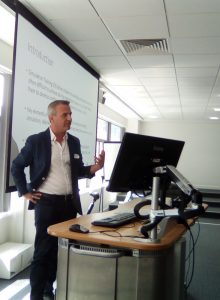 In the first week of July Bournemouth University ran its second international midwifery education conference in the Executive Business Centre. This year’s conference was called ‘What works in midwifery education? A conference run by midwifery educators for midwifery educators.’ CMMPH (Centre for Midwifery, Maternal & Perinatal Health) brought together nearly 100 delegates on Thursday and Friday (July 5-6). There were presentations and posters from midwifery educators based in in all four countries of the UK, Germany, Belgium, Switzerland and Australia, resulting in lively stimulating debates.
In the first week of July Bournemouth University ran its second international midwifery education conference in the Executive Business Centre. This year’s conference was called ‘What works in midwifery education? A conference run by midwifery educators for midwifery educators.’ CMMPH (Centre for Midwifery, Maternal & Perinatal Health) brought together nearly 100 delegates on Thursday and Friday (July 5-6). There were presentations and posters from midwifery educators based in in all four countries of the UK, Germany, Belgium, Switzerland and Australia, resulting in lively stimulating debates.
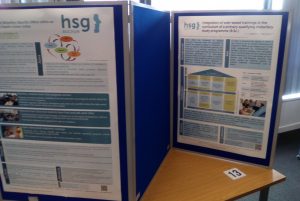
The conference organisers has teamed up with the leading scientific journal in the field Midwifery (published by Elsevier). To coincide with BU’s conference Midwifery published this month its special issue on Midwifery Education. This special issue was introduced at the conference by Dutch midwife Dr. Ans Luyben, one of the special issue’s editors.
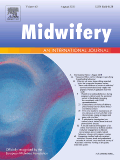 The conference awarded two prizes for the best poster. One prize was for the best academic poster and one voted by the conference audience. The former prize was won by a poster from NHS Education for Scotland. The public’s poster prize was won by a poster from the University of Bradford jointly produced by film students and student midwives.
The conference awarded two prizes for the best poster. One prize was for the best academic poster and one voted by the conference audience. The former prize was won by a poster from NHS Education for Scotland. The public’s poster prize was won by a poster from the University of Bradford jointly produced by film students and student midwives.
The main conference organisers Dr. Catherine Angell and Dr. Sue Way from CMMPH said afterwards that the success of the conference means that CMMPH will organise a third midwifery education conference run for and by educators in three years’ time.
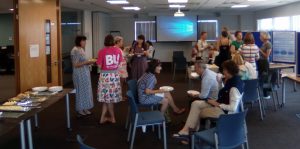
After completing the second year of my Biological Sciences course I wished to gain some formal research experience so I applied to be a Student Research Assistant with the Ageing and Dementia Research Centre at Bournemouth University. Understanding the significance of dementia related problems, I was excited and proud to get involved with research on such a problematic and widespread condition, and to work alongside Professor Jane Murphy.
The project aim was to evaluate the impact and use of a learning resource and training video produced by the Ageing and Dementia Research Centre. I was provided with a well-structured plan for my 4-week project. Principally, this involved collating data from a questionnaire regarding the resource’s usefulness, analysing the results using qualitative methods, and producing a report of the results.
I got stuck in quickly and within hours I had already mastered aspects of Excel and Word I had never used previously. As the work began to develop momentum, data analysis became the next task to be executed. My course has always prioritised quantitative data analysis due to the nature of data usually obtained, and I had no prior experience working with qualitative data. By the end of the third week I had delved into various approaches in the field of qualitative research, and had conducted a thematic analysis of over 400 questionnaire answers.
Prior to this experience, the research process was alien to me. However now I have knowledge of the different stages involved and the fundamental organisational skills required, which has really helped me plan and develop ideas for the independent research project in my final year. I have really enjoyed the project and have developed incredibly useful skills as well as learning about nutritional care for people who have dementia.


 Professor Genoveva Esteban (Department of Life and Environmental Sciences, Faculty of Science and Technology) in collaboration with the Freshwater Biological Association, is running an Advanced Training Course on Freshwater Taxonomy and Field Identification Skills for PhD students, early-career researchers, and post-grads.
Professor Genoveva Esteban (Department of Life and Environmental Sciences, Faculty of Science and Technology) in collaboration with the Freshwater Biological Association, is running an Advanced Training Course on Freshwater Taxonomy and Field Identification Skills for PhD students, early-career researchers, and post-grads.
The course has been funded by the Natural Environment Research Council (NERC) and has a maximum of 20 places available for UK-based applicants. Travel (up to £100) and accommodation are covered. The course will be based at the River Laboratory in Dorset, 24th-28th September 2018.
To find out more and to apply visit: https://www.fba.org.uk/courses
Deadline is now 31st July 2018.
If you require further information please contact Genoveva Esteban gesteban@bournemouth.ac.uk
Both BU libraries (Bournemouth House Library at Lansdowne and The Sir Michael Cobham Library at Talbot) will be open over the summer break and library staff will be available for help and advice. Check the website for full details of the library opening hours over the holidays. A helpful guide on library facilities for research outlines the full range of services and resources that are accessible all year round.
If studying at home over the break, loanable items can be borrowed for the whole of the vacation. Also, the e-journals and e-books that BU subscribes to are all available off campus. Detailed help in accessing e-resources off campus is available online in our library guide. If researchers are staying here in Bournemouth, there is plenty of quiet study space and computers in the library, as well as printing, copying and scanning facilities.
Note that due to essential maintenance work by IT Services, the libraries will be closed on the following dates although e-resources will continue to be available off-campus as usual:
Saturday 30 June: Bournemouth House Library closed all day.
Saturday 14 July: The Sir Michael Cobham Library closed all day.
Both libraries will be closed on bank holiday Monday 27 August.